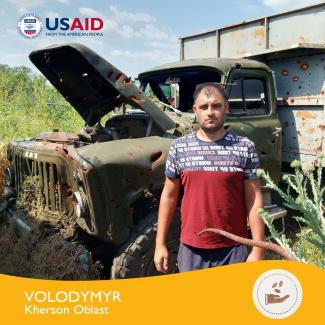Volodymyr is a farmer from the right bank of Kherson region. Before Russia’s full scale invasion in February 2022, he was working hard to expand his family farm.
“My parents worked on small plots of land,” he explains. “Our equipment was humble - an ancient combine harvester, a cargo truck. We worked slowly and steadily. Then I took over the business and started expanding the farming land. With time, I bought more equipment. That's how we grew.”
Russia’s full-scale war took a heavy toll on his farm. His land fell under Russian occupation. Later, the front line ran directly through Volodymyr’s fields, with battles raging for more than half a year.
“We had no choice but to leave our home and land, leaving everything behind," says Volodymyr.
He could only return after the Ukrainian Armed Forces had regained control over the territories. But his homecoming was devastating all over again. His farm, that he had worked so hard to grow, now consisted of damaged machinery, ruined warehouses, and land sown with mines rather than crops.
For agri-producers in Ukraine’s liberated territories who bore the brunt of Russia’s war, like Volodymyr, everything is in short supply – funds, resources, machinery.
“The main goal is to repair the machinery and storage facilities and to de-mine the fields. We need to reclaim what we've lost. We are deeply upset by this. The farm is in ruins but it’s still ours. What good would it be if it were intact but someone else’s?” says Volodymyr.
“When we returned, we were shocked to see our two warehouses destroyed, the produce burnt to cinders. Crops were still in the fields, unharvested, but we couldn't access them... To this day, we've managed to till only a third of our land. We entered the fields at our own risk, inspecting every plot ourselves, with [landmine] detectorists leading the way,” recalls Volodymyr.
Demining operations are mostly focused on residential areas and roads for now, and the services of private demining companies are prohibitively expensive for small farmers.
“Whenever we could, we examined the plots ourselves, but everything's overgrown with weeds since spring... “We’re still unsure of our next steps,” Volodymyr adds.
Volodymyr’s farm has a long road to recovery. USAID provided the farm with sunflower seeds as part of the spring sowing campaign in 2023. At that time, over 1,200 agri-producers were provided with sunflower seeds under USAID’s Agriculture Resilience Initiative – AGRI-Ukraine.
“We were strapped for cash. When the planting season arrived, we had some leftover seeds from the previous year, but some of it was looted by marauders... Thanks to USAID we got sunflower seeds. This was substantial help for us. We managed to sow the plots that were accessible,” says Volodymyr.
Volodymyr will sell the sunflower harvest resulting from these seeds, and use the income for urgent needs, restoration, and the next sowing season. He holds onto the hope that he will gradually recover, reclaim what was lost, and then continue to grow.
USAID agricultural programs, including AGRI, support small agricultural producers from Ukraine’s liberated territories to help them get back on track. In the spring of 2023, over 8,200 Ukrainian farmers, including those in de-occupied, front-line, and war-affected areas, received 6,300 tons of fertilizers from USAID, as well as seeds for sowing over 48,300 hectares of sunflower and 15,000 hectares of corn.

